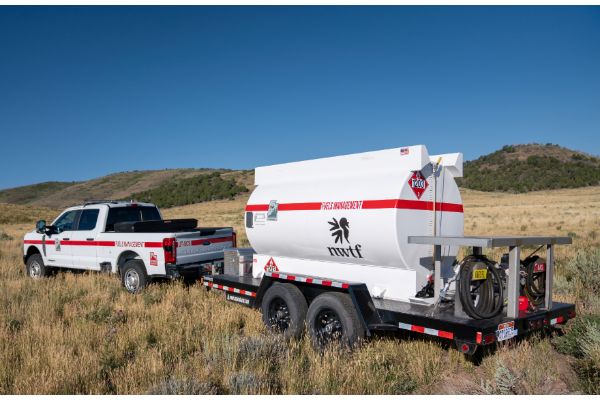Fueling Conservation

EDGEFIELD, S.C. — The Utah NWTF State Chapter contributed $45,000 to the Utah Department of Natural Resources and the Utah Division of Forestry, Fire and State Lands Central Area for the purchase of a DOT-approved fuel transport trailer. This trailer, capable of carrying 1,100 gallons of fuel (800 gallons diesel and 300 gallons ethanol-free unleaded), will play a critical role in supporting prescribed fire operations on federal, state and private lands throughout Utah, benefiting forest health and wildlife habitats.
The addition of the fuel trailer marks a significant improvement in the efficiency of Utah’s prescribed burns, allowing large quantities of fuel to be delivered to remote forest locations without relying on the State of Utah’s fuel purchasing system. With this trailer, prescribed fire partners can now ensure fuel availability on-site, ready at a moment’s notice for burn operations.
The trailer was deployed during the spring 2024 burn season, and its impact is already significant. During its first burn window, the trailer was used to fuel prescribed burns covering 3,500 acres across three Utah national forests: the Manti-La Sal, Fishlake and Uinta-Wasatch-Cache. The improved access to fuel has also streamlined burn operations, reduced logistical stress and saved approximately $1,000 per day in costs.
“Its ability to support aerial and on the ground ignition operations has greatly increased the efficiency of prescribed fires across national forests and private lands,” said Chuck Carpenter, NWTF district biologist for Utah, Idaho, Arizona and New Mexico. “The trailer will continue to be a key asset in ensuring successful prescribed burn operations for the next 10-15 years, helping multiple agencies across Utah meet critical prescribed fire needs and restore countless acres of vital habitat.”
Prescribed fire is an essential tool for managing forests and reducing the risk of catastrophic wildfires. Through its mission to conserve the wild turkey and preserve hunting heritage, the NWTF recognizes the importance of creating healthy forest ecosystems with prescribed fire. This practice not only helps manage wildfire risks but also enhances wildlife habitats, particularly for wild turkeys.
“Prescribed burns play a key role in maintaining diverse, healthy habitats,” Carpenter said. “One of the most immediate benefits of prescribed fire is the improvement in forage quality. For wild turkeys, the regrowth of plants after a fire attracts insects, which are critical for the diet of young turkeys (poults) in the spring. By reducing dense underbrush and promoting new growth of grasses, forbs and shrubs, fire creates a more balanced landscape. For wild turkeys, these open areas are essential, as they provide improved access to food and allow easier movement through the terrain. The fresh, nutrient-rich plant growth that follows a burn is not only beneficial for turkeys but also supports a variety of wildlife, from small mammals to large herbivores.”
The long-term benefits of prescribed burns are far-reaching, supporting not only wild turkeys but also a wide range of wildlife. With projects like this fuel trailer, the NWTF is helping partners in Utah advance wildfire management and ecosystem health for future generations.
About the National Wild Turkey Federation
Since 1973, the National Wild Turkey Federation has invested over half a billion dollars into wildlife conservation and has positively impacted over 23 million acres of critical wildlife habitat. The NWTF has also invested over $10 million into wild turkey research to guide the management of the wild turkey population and to ensure sustainable populations into perpetuity. The organization continues to deliver its mission by working across boundaries on a landscape scale through its Four Shared Values: clean and abundant water, healthy forests and wildlife habitat, resilient communities, and robust recreational opportunities. With the help of its dedicated members, partners and staff, the NWTF continues its work to provide Healthy Habitats. and Healthy Harvests. for future generations.
